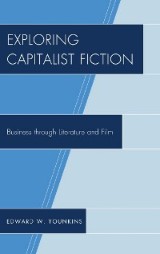Details

Exploring Capitalist Fiction
Business through Literature and Film|
48,99 € |
|
| Verlag: | Lexington Books |
| Format: | EPUB |
| Veröffentl.: | 24.10.2013 |
| ISBN/EAN: | 9780739184288 |
| Sprache: | englisch |
| Anzahl Seiten: | 332 |
DRM-geschütztes eBook, Sie benötigen z.B. Adobe Digital Editions und eine Adobe ID zum Lesen.
Beschreibungen
<span><span>Fiction, including novels, plays, and films, can be a powerful force in educating students and employees in ways that lectures, textbooks, articles, case studies, and other traditional teaching approaches cannot. Works of fiction can address a range of issues and topics, provide detailed real-life descriptions of the organizational contexts in which workers find themselves, and tell interesting, engaging, and memorable stories that are richer and more likely to stay with the reader or viewer longer than lectures and other teaching approaches. For these reasons, </span><span>Exploring Capitalist Fiction: Business through Literature and Film</span><span> analyzes 25 films, novels, and plays that engage the theories, concepts, and issues most relevant to the business world. Through critical examinations of works such as </span><span>Atlas Shrugged</span><span> and </span><span>Wall Street</span><span>, Younkins shows how fiction is a powerful teaching tool to sensitize business students without business experience and to educate and train managers in real businesses.</span></span>
<br>
<span></span>
<br>
<span></span>
<span><span>In </span><span>Exploring Capitalist Fiction: Business through Literature and Film</span><span>, Edward W. Younkins proposes that the use of imaginative literature to portray and explain the behavior of individuals in business is a method that is richer and more realistic than what is presented in journal articles, textbooks, and even case studies. </span></span>
<span><span>Preface<br>Introduction<br>Chapter 1. </span><span>The Rise of Silas Lapham</span><span>: A Story of Self-Identity, Self-Respect, and Morality<br>Chapter 2. Taking a Look at Edward Bellamy's </span><span>Looking Backward</span><span><br>Chapter 3. Frank Norris's </span><span>The Octopus</span><span>: An Epic of Wheat and Railroads<br>Chapter 4. </span><span>The Financier</span><span>: Theodore Dreiser's Portrait of a Darwinian Businessman<br>Chapter 5. Abraham Cahan's </span><span>The Rise of David Levinsky</span><span><br>Chapter 6. </span><span>Babbitt</span><span>: Sinclair Lewis's Portrait of a Middle-Aged Middle Class Businessman<br>Chapter 7. "Who is Henry M. Galt?": A Review of Garet Garrett's </span><span>The Driver</span><span><br>Chapter 8. F. Scott Fitzgerald's </span><span>The Great Gatsby</span><span><br>Chapter 9. </span><span>An American Romance</span><span>: King Vidor's Epic Film of Immigration and the American Dream<br>Chapter 10. Arthur Miller's </span><span>Death of a Salesman</span><span>: A Case of Self-Delusion<br>Chapter 11. John P. Marquand's </span><span>Point of No Return</span><span><br>Chapter 12. Henry Hazlitt's </span><span>Time Will Run Back</span><span>: A Tale of the Reinvention of Capitalism<br>Chapter 13. </span><span>Executive Suite</span><span>: A Story of Corporate Success and Succession<br>Chapter 14. </span><span>Cash McCall</span><span>: The Story of a Heroic Corporate Rider<br>Chapter 15. Sloan Wilson's </span><span>The Man in the Gray Flannel Suit</span><span><br>Chapter 16. </span><span>Atlas Shrugged</span><span>: An Epic Story of Heroic Businessmen<br>Chapter 17. </span><span>Sometimes a Great Notion</span><span>: The Story of a Family Who Would Never Give an Inch<br>Chapter 18. Wilfrid Sheed's </span><span>Office Politics</span><span>: A Lesson about Organizational Conflict<br>Chapter 19. </span><span>The Franchiser</span><span>: Stanley Elkin's Tale of a Man Who Wanted to Costume the Country<br>Chapter 20. </span><span>Glengarry Glen Ross</span><span>: A David Mamet Word Play<br>Chapter 21. </span><span>Wall Street</span><span>: Oliver Stone's Zero-Sum Vision of Capitalism<br>Chapter 22. </span><span>Tucker: The Man and His Dream</span><span><br>Chapter 23. David Lodge's </span><span>Nice Work</span><span>: A Tale of Two Cultures<br>Chapter 24. </span><span>Other People's Money</span><span>: A Tale of Capitalism and Creative Destruction<br>Chapter 25: </span><span>Wall Street: Money Never Sleeps</span><span><br>Conclusion</span></span>
<br>
<span></span>
<br>
<span></span>
<span><span>In </span><span>Exploring Capitalist Fiction: Business through Literature and Film</span><span>, Edward W. Younkins proposes that the use of imaginative literature to portray and explain the behavior of individuals in business is a method that is richer and more realistic than what is presented in journal articles, textbooks, and even case studies. Through critical examinations of works such as </span><span>Atlas Shrugged</span><span> and </span><span>Wall Street</span><span>, Younkins shows how fiction is a powerful teaching tool to sensitize business students without business experience and to educate and train managers in real businesses.</span></span>
<span><span>Edward W. Younkins</span><span> is professor of accountancy and director of graduate programs in the Department of Business at Wheeling Jesuit University.</span></span>
<br>
<span></span>
<br>
<span></span>

















